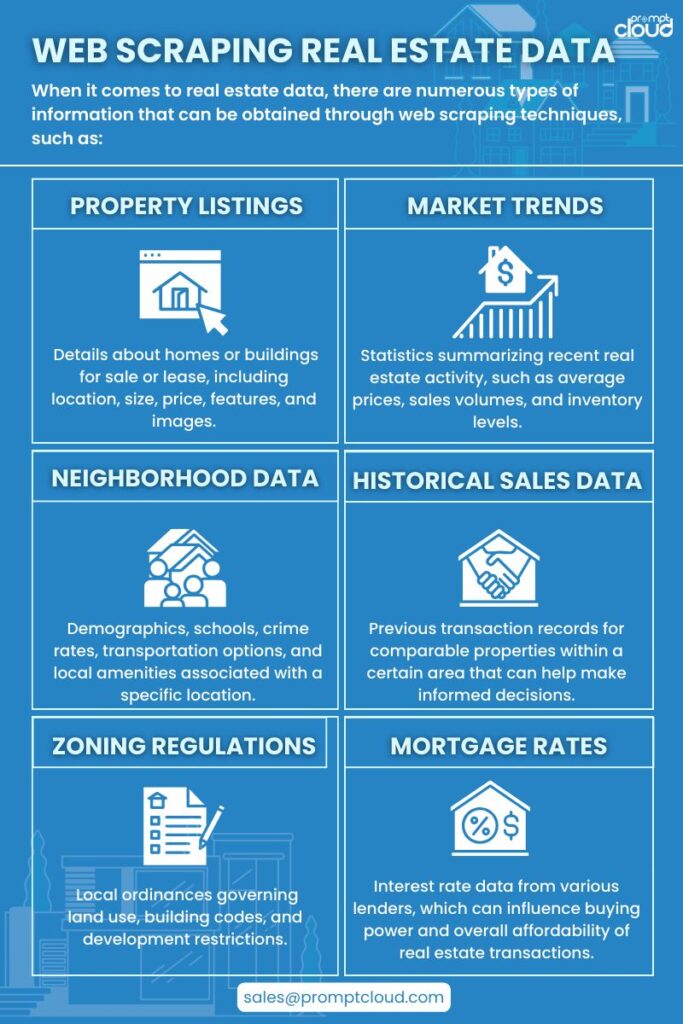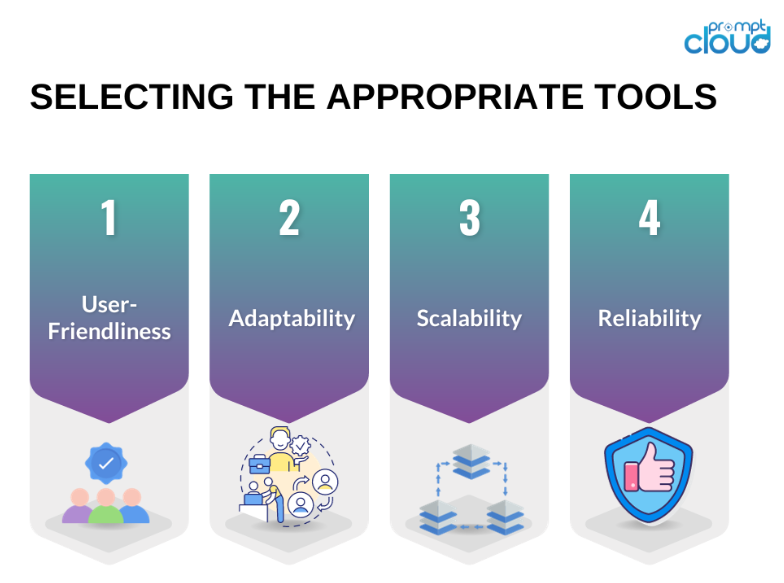
The real estate industry has always been driven by data, but the advent of advanced technologies like web scraping and data analytics has transformed the landscape. Today, real estate professionals have access to unprecedented amounts of data, enabling them to make more informed decisions, predict market trends, and ultimately stay ahead of the competition. In this article, we will explore how scraping real estate data can future-proof your business, offering actionable insights and strategic advantages.
The Power of Data in Real Estate

Data has become the cornerstone of successful real estate businesses, driving informed decision-making and strategic planning. Scraping real estate data allows professionals to gain critical insights into various aspects of the market, enabling them to stay ahead in a competitive industry. Here are some key areas where data-driven insights make a significant impact:
Market Analysis
Understanding current market conditions and predicting future trends is essential for any real estate professional. Through comprehensive market analysis, which involves examining historical data, economic indicators, and demographic trends, professionals can forecast market movements and identify emerging opportunities.
For instance, scraping real estate data and by analyzing data on housing starts, mortgage rates, and employment figures, real estate firms can predict whether a market is heading towards a boom or a downturn. This foresight allows them to make proactive decisions, such as adjusting investment strategies, optimizing property portfolios, and timing the market effectively.
Property Valuation
Accurately assessing property values is crucial for both buyers and sellers in the real estate market. Data-driven property valuation involves collecting and analyzing data on comparable sales, neighborhood trends, property characteristics, and even local amenities. Advanced algorithms and machine learning models can process this data to provide precise valuations, reducing the risk of overpaying or underselling properties.
For example, platforms like Zillow utilize vast amounts of data to generate Zestimates, offering homeowners and potential buyers a data-backed estimate of a property’s worth. This accuracy in valuation helps in negotiating better deals and making sound investment decisions.
Customer Insights
Understanding buyer preferences and behavior is pivotal for tailoring marketing strategies and enhancing customer satisfaction. Data analytics can reveal patterns in what types of properties buyers are interested in, their preferred locations, price ranges, and even specific features like proximity to schools or public transport.
Scraping real estate data and by analyzing data from property searches, social media interactions, and customer feedback, real estate professionals can create detailed buyer personas and target their marketing efforts more effectively. This targeted approach not only increases the chances of closing deals but also enhances the overall customer experience by meeting their specific needs and desires.
Competitive Analysis
Keeping an eye on competitors is essential in the fast-paced real estate market. Data-driven competitive analysis involves monitoring competitors’ listings, pricing strategies, marketing campaigns, and customer reviews. By scraping data from competitors’ websites and analyzing trends, real estate firms can identify gaps in the market and areas where they can differentiate themselves.
For instance, if a competitor is seeing success with a particular type of property or marketing approach, other firms can adapt their strategies accordingly. Additionally, understanding competitors’ strengths and weaknesses allows for strategic positioning, ensuring that a firm can capitalize on opportunities and mitigate potential threats.
Implementing Web Scraping for Real Estate
Implementing web scraping for your real estate business involves several steps, from choosing the right tools to ensuring compliance with legal and ethical guidelines. Here’s a step-by-step guide to help you get started with scraping real estate data:
Step 1: Choose the Right Web Scrapping Tools

There are several web scraping tools available, ranging from simple browser extensions to advanced programming libraries. Some popular tools for scraping real estate data include:
- BeautifulSoup: A Python library for parsing HTML and XML documents.
- Scrapy: An open-source web crawling framework for Python.
- Octoparse: A no-code web scraping tool with a user-friendly interface.
- ParseHub: A visual data extraction tool with powerful features.
Step 2: Identify Data Sources
Identify the websites and online platforms from which you want to scrape data. These could include real estate portals like Zillow, Realtor.com, and Redfin, as well as public records, social media, and property listing sites. Ensure that the data sources are reliable and regularly updated.
Step 3: Develop Scraping Scripts
Develop scraping scripts to extract the required data. If you’re using programming libraries like BeautifulSoup or Scrapy, you’ll need to write code to navigate the websites, extract the data, and store it in a structured format. If you’re using no-code tools, you can use their visual interface to configure the scraping process.
Step 4: Store and Process Data
Once you’ve scraped the data, you need to store it in a database or data warehouse. This allows you to organize and manage the data effectively. You can then use data analytics tools to process and analyze the data, extracting valuable insights that can inform your business decisions.
Step 5: Ensure Legal and Ethical Compliance
It’s important to ensure that your web scraping activities comply with legal and ethical guidelines. Many websites have terms of service that prohibit scraping, and violating these terms can result in legal consequences. Additionally, ensure that you respect data privacy laws and regulations, such as the GDPR and CCPA.
Real Estate Businesses Leveraging Data-Driven Insights
Data-driven insights have become a game-changer in the real estate industry, enabling companies to make informed decisions and stay competitive.
Case Study 1: Zillow

Source: scrapehero
Zillow, one of the largest online real estate marketplaces, exemplifies the power of data-driven insights. The cornerstone of Zillow’s success is its Zestimate, an automated valuation model (AVM) that provides property valuations. These Zestimates are generated by collecting and analyzing data from various sources, including public records, MLS listings, tax records, and user-generated content.
Zillow’s AVM processes millions of data points to offer users accurate and up-to-date property valuations. For instance, Zillow integrates data on property characteristics, historical sales, market trends, and even neighborhood amenities to enhance the accuracy of its Zestimates. According to Zillow, its Zestimate algorithm was updated in 2019 with machine learning techniques that improved its accuracy by over 4%. This enables users to make better-informed decisions about buying, selling, or renting properties.
Moreover, Zillow uses web scraping to gather listing information and market data from hundreds of sources, ensuring a comprehensive view of the market. This data-driven approach has positioned Zillow as a trusted resource for real estate information, attracting millions of users monthly.
Case Study 2: Redfin

Source: crawlbase
Redfin, another major player in the real estate industry, leverages data-driven insights to enhance user experience and optimize its services. Redfin’s platform provides personalized property recommendations based on detailed analysis of user behavior and preferences.
Redfin collects data on users’ search histories, preferences for property types, locations, price ranges, and even interactions with specific listings. This information is analyzed using machine learning algorithms to provide tailored property suggestions. For example, if a user frequently searches for three-bedroom houses in suburban areas with good school districts, Redfin’s algorithm will prioritize showing similar properties that match these criteria.
Additionally, Redfin uses data analytics to offer insights into market trends and competitive pricing. Their Market Data Center provides users with real-time data on home prices, sales volumes, and market trends in various regions. By integrating MLS data and public records, Redfin ensures its users have access to the most current and relevant market information.

Source: crawlbase
Redfin’s data-driven approach has proven effective in increasing user engagement and satisfaction. According to Redfin, users who receive personalized recommendations are 20% more likely to engage with the platform and ultimately make a purchase.
Conclusion
Scraping real estate data and leveraging data-driven insights can future-proof your real estate business, providing a strategic advantage in a competitive market. By implementing web scraping techniques and analyzing the collected data, you can gain valuable insights into market trends, property values, customer preferences, and competitor strategies. As technology continues to evolve, staying ahead of the curve and embracing data-driven approaches will be crucial for success in the real estate industry.
Whether it’s Zillow’s advanced property valuation models, Redfin’s personalized recommendations, or a local agency’s strategic investment advice, leveraging data allows real estate professionals to make smarter decisions, enhance customer experiences, and stay ahead of the competition. The future of real estate is data-driven, and those who embrace this trend will be well-positioned to thrive in an ever-changing market.
Ready to harness the power of data-driven insights for your real estate business? At PromptCloud, we specialize in web scraping solutions that provide you with the comprehensive, real-time data you need to stay ahead. From market analysis to competitive intelligence, our services help you make informed decisions and maximize your returns.
Contact us today to learn how PromptCloud can future-proof your real estate business with cutting-edge data scraping solutions.




















